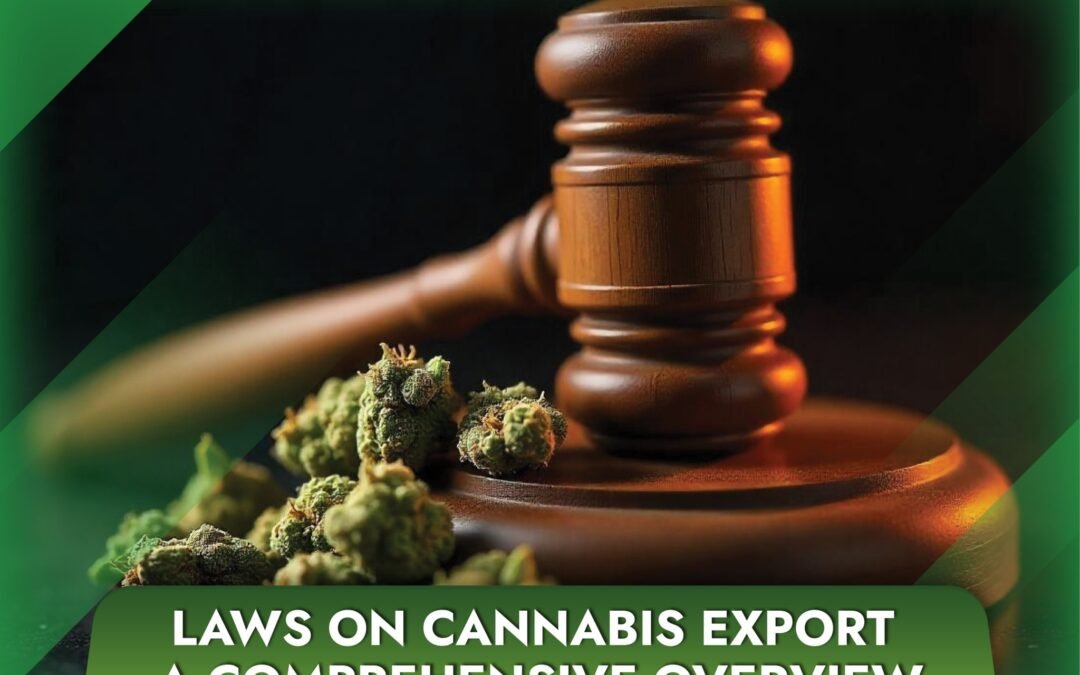The global cannabis market is expanding rapidly as more countries move toward legalization for both medical and recreational use. However, exporting cannabis is still a complex and highly regulated process, subject to a variety of international and national laws, for businesses looking to enter the cannabis export market, understanding the restrictions, permits required, global legal frameworks, and potential challenges is crucial. This article outlines the key aspects of cannabis export regulations, focusing on rules and permits, international laws, and the exceptions and challenges involved.
1. Restrictions and Permits
Exporting cannabis involves navigating strict regulations that vary by country. In many regions, exporting cannabis is only allowed for medical purposes, and even then, only under stringent conditions.
- Medical Cannabis Export: For countries that permit the export of cannabis, such as Canada, Colombia, and Israel, businesses must comply with specific guidelines. These regulations typically include acquiring a government-issued export license, adhering to Good Manufacturing Practices (GMP), and ensuring the cannabis products are intended for medical purposes.
- Permits and Licensing: Countries that allow cannabis exports often require exporters to obtain special permits. For instance, Canada’s cannabis exporters must obtain an export permit from Health Canada, which oversees the entire process to ensure compliance with both domestic and international laws. Israel, another major player in the medical cannabis export market, requires stringent approval from the Ministry of Health.
- Quantity and Destination Restrictions: Some countries place limits on the amount of cannabis that can be exported and require detailed documentation of the final destination. Exporters must also ensure that the destination country allows the import of cannabis. Any deviation from approved amounts or end-use declarations can result in severe penalties.
2. International Laws
International laws play a critical role in regulating the cannabis export market. Most countries are signatories to international drug control treaties, which limit the production, trade, and use of cannabis for medical and scientific purposes.
- United Nations Treaties: The Single Convention on Narcotic Drugs of 1961, the Convention on Psychotropic Substances of 1971, and the United Nations Convention against Illicit Traffic in Narcotic Drugs and Psychotropic Substances of 1988 are key international treaties that regulate the global cannabis trade. These treaties classify cannabis as a controlled substance, restricting its trade to approved purposes, primarily medical and scientific.
- Compliance with International Law: Even if a country has legalized cannabis for medical or recreational use domestically, it is still bound by these international treaties. Countries like Canada and Uruguay, which have legalized recreational cannabis, must ensure their exports comply with international obligations, limiting their trade to medicinal or research purposes.
- Customs Regulations: Each country’s customs authority plays a role in regulating cannabis imports and exports. Businesses need to work closely with both domestic and international customs agencies to ensure the smooth movement of goods across borders. Proper documentation, including permits and certificates of origin, is crucial for avoiding delays and potential legal issues at international borders.
3. Exceptions and Challenges
Despite the increasing global acceptance of cannabis, the export of cannabis still faces numerous challenges. These challenges range from the complexity of regulations to the lack of harmonization in global cannabis laws.
- Different Legal Frameworks: The most significant challenge in the cannabis export market is the variation in laws between countries. Some nations, like Germany and Australia, allow the importation of medical cannabis, while others maintain strict bans on any form of cannabis, regardless of its intended use. Exporters must navigate this patchwork of regulations carefully to avoid legal issues.
- Exporting to Countries with Varying Legal Status: Cannabis remains illegal for both medical and recreational use in many countries, creating challenges for exporters. For example, while countries like Israel and Canada have thriving medical cannabis export industries, they can only export to countries that have legalized cannabis for medical use.
- Regulatory Complexity: Exporting cannabis requires businesses to comply with not just national laws, but also the laws of the importing country, international regulations, and even regional agreements. Navigating this regulatory web can be time-consuming and expensive. In some cases, countries may have restrictions on the types of cannabis products that can be imported, such as prohibiting products with high THC content.
- Market Competition: The burgeoning cannabis market has become highly competitive, especially as more countries legalize cannabis production. Exporters from established markets, like Canada, face competition from countries with lower production costs, such as Colombia. Businesses need to balance quality, cost, and regulatory compliance to remain competitive in the global market.
Conclusion
The export of cannabis is a rapidly growing industry, but it remains tightly regulated by both national and international laws. Businesses looking to export cannabis must understand the complexities of obtaining the necessary permits, navigating international laws, and addressing the challenges that come with varying legal frameworks across the globe. With proper compliance and a clear understanding of the legal landscape, the cannabis export market offers significant opportunities for growth, particularly in the medical cannabis sector. However, exporters must remain vigilant about the evolving regulatory environment to ensure success in this burgeoning market.

